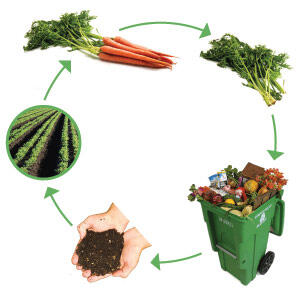- Log in to post comments

What’s driving the Organics Food Waste ban in Metro Vancouver?
Metro Vancouver has been banning materials from local landfills for over 25 years. It began with banning cardboard from landfill. The latest banded material that added was organics in 2017. Landfill bans are a regulatory tool for local governments that drive a bunch of activity including: business must separate the category of waste from their regular garbage. In addition, recycling or hauling companies must pick organics up separately. Lastly of course, end markets must be in place to receive and recycle the materials diverted from landfill. Sound simple?
Well it is simple, mostly.
For businesses, organics separation and diversion are fairly straightforward- it pretty clear what is organic matter and what is not. There are some products that you might not guess can be put into the organics stream, for example: clean hand towels, soiled paper food containers, coffee filters and meat bones. Communication is a key to making sure everyone knows and understands what can be placed into an organics bin. Clear signage by the bin and clear signage on a staff community board usually are enough to clarify and keep everyone on the same page.
There are some organics recycling issues that are more complicated and require some thought including: what type of collection bin do you want in your office or place of business? There are a wide variety of bins available. Your service provider should be able to recommend a variety of options. Another issue that does require some consideration is where are you going to put your storage bin? The container or bin that you use to collect the organics in the kitchen is likely not the container that your recycling company will pick up. You will need to give some thought where to place the bin to make it convenient for yourself to access and of course for the recycler picking it up. A good location for the larger collection bin is outside, or close to an outside door that does not impact the flow of your goods and services. Which leads to another issue: many businesses don’t have a lot of extra room to store outgoing waste and recyclables. You may have to be creative in finding the space that you need to have collection bins in place.
The regulatory or bylaw change that bans a material such as carboard or organics from landfill elicits a flurry of activity including education of employees or tenants, purchasing collection bins, contracting the collection and of course, the end markets or processor that must handle the larger volumes of the banned material and make something new.
The end outcome of a material ban is much more complicated than one could consider. A material ban drives investment in infrastructure required to store and collect the banned material, it drives education and communication and most importantly it improves our waste diversion results and reduces waste to landfills.
For more information about Urban Impact’s organics services, please review: https://urbanimpact.com/organics-recycling
